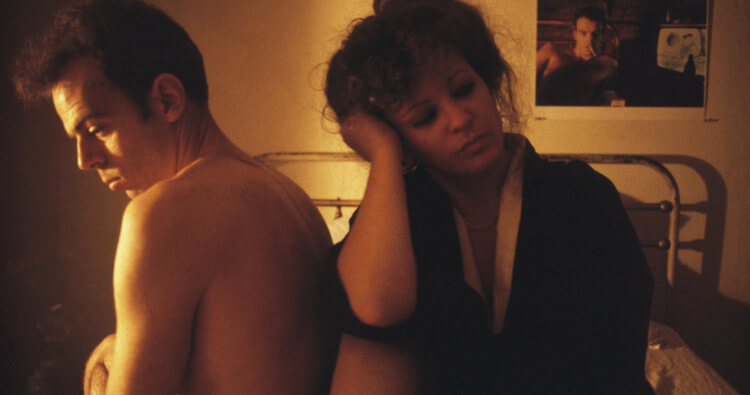Tbilisi Photo Festival: award-winning works, launch of photography museum for anniversary edition

A photograph from the visual diary ‘The Ballad of Sexual Dependency’ by Nan Goldin. Photo: Tbilisi Photo Festival.
Works by over 300 contemporary photographers, on subjects ranging from intimate personal experiences to immigration and politics, will make the anniversary 10th edition of the Tbilisi Photo Festival the regional photography occasion to attend starting next week.
Photo displays, screenings and the central Night of Photography event will all be hosted alongside panel discussions involving professionals over ten days in the capital city.
Organisers have promised a “celebration of world-class photography” through “outstanding exhibitions” involving photographers including Thomas Dworzak, agencies like NOOR and a launch of the Tbilisi Photography & Multimedia Museum.
Before the principal Night of Photography occasion, three events will lead viewers into this year’s programme starting with American photographer Nan Goldin and her candid visual diary The Ballad of Sexual Dependency.
Considered a “contemporary classic” (Tbilisi Photo Festival), the work will be displayed in Georgia for the first time to explore the human condition through subjects including gender and addiction.
In a change of subject from personal to global, award-winning NOOR photographers Yuri Kozyrev and Kadir van Lohuizen will bring their shots from a 15,000 kilometre-long travel across the Arctic Circle that inquire into the “startling effects” of climate change in the region and on its indigenous people.
Titled Arctic: New Frontier, the works were distinguished with the 9th edition of Carmignac Photojournalism Award and serve to confront the public with a stark prospect of a “total disappearance” of the sea ice across the globe.
A talk on communication through various media forms will be hosted by the MAPS Images collective of documentary photographers in the third event of the festival, with the slideshow-accompanied discussion titled MAPS: Focus on Transmission introducing the group proposing “new ways and approaches of storytelling”.
Taking over from the opening shows, the Night of Photography, which has become a highlight of the Tbilisi celebration, will host enthusiasts for night-time screenings of “first-class photography from around the world” in the city’s Mushtaidi Park.
Through works from about 400 photographers and projects including Ukrainian photo diaries from the Odesa Photo Days Festival, Contemporary African Photography prize-winners and young photographers highlighted by the Berlinskej model gallery, the event will seek to serve its long-standing mission of “us[ing] the medium of photography as a universal language to connect Georgia to the rest of the world”.
Held in partnership with France’s Les Rencontres d’Arles festival in a nod to the very first edition of the Night of Photography in Georgia’s capital, the show will mark the success of the annual event that has hosted around 10,000 viewers every year.
Taking over from the central highlight, daily shows will continue the festival by featuring photographers like Grégoire Eloy with his Bird’s Nesters exploration of the human relation to nature and Weronika Gesicka and her series challenging the concept of the American Dream with a look at its darker side in Confusion.
In another highlight event, organisers will host the launch of the Tbilisi Photography & Multimedia Museum, a recently founded institution with a focus on effecting a “social and cultural change” in the South Caucasus region through photography.
Started in 2018, the TPMM was inspired by the late 19th century Travelling Museum of the Caucasus, which brought exhibits of the South Caucasian cultural heritage to various locations throughout the region. Last year the museum hosted series of showcases bringing photographic art to the remote location of Omalo in Georgia’s north-east.
In the festival launch, the TPMM will introduced along with a video installation by Vincent Moon and Priscilla Telmon, a major “multi-screen” work ten years in the making. UNUS MUNDUS: Rituals and Trances is comprised of over 100 films themed around sacred music and rituals, from Sufi rituals in Chechnya to shamanic plants used in the Amazon rainforest.
Following on, a panel involving artists who have worked on the subject of migration around the world will touch the subject through two angles — a talk on the immigration in Europe over the recent years and a focus on migration in and out of Georgia in the reality following the country’s 2017 visa liberalisation with the European Union.
More political subjects talked at the festival will include a discussion on utilisation of fact-checking for creating news reports — with a focus on Russia’s disinformation campaign in Georgia and Ukraine following its conflicts with the countries in 2008 and 2014 respectively — and a TPMM project on the political power of images involving visual anthropologists.
In another part of the festival, photographers from across the South Caucasus will be featured in a group exhibition of over 20 projects, as a highlight of multi-genre works ranging from documentary creations to those bordering contemporary art.
The display will seek to promote emerging regional artists involved in subjects ranging from conflicts to marginalisation and women’s rights.
Organisers will also host Kummer & Herrman, a notable photobook design office, in a celebration of their 20th anniversary, with a talk by artistic director Jeroen Kummer and a slideshow introducing their story to festival-goers.
This year’s Tbilisi Photo Festival is set to run between September 12-21, with the full programme available here.
 Tweet
Tweet  Share
Share